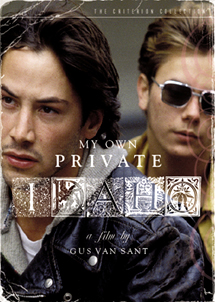|
Reviews of Recent Independent, Foreign, & Documentary Films in Theaters and DVD/Home Video
MY OWN PRIVATE IDAHO
In Gus Van Sant's Mala Noche (1985) and My Own Private Idaho
(1991), men have sex with other men. But their actions are as much a
function of class, power, and race, as they are of same-sex
attraction. Even in the satirical Drug Store Cowboy (1989) and To Die For
(1995), Van Sant is concerned with down-and-out, possibly drug-addicted outsiders who live
their lives, sensitively, at society's edge.
With such a focus it's not surprising Van Sant has worked with untrained
actors, most notably in Elephant (2003). In an interview on the new DVD
edition of Idaho, Van Sant reveals to fellow gay director Todd Haynes
he considered using only non-actors for Idaho. But then Keanu
Reeves, pin-up star in search of an art project, came on board, and not far
behind him, the talented River Phoenix. Non-actors were cast in
supporting roles.
All this, plus Van Sant's penchant for tapping sources as disparate as road
movies, Westerns, and Shakespeare's Henry IV, makes My Own Private Idaho the
most Gus Van Sant of Gus Van Sant films. It is also one of the most trying.
The Henry IV narrative slowly, very slowly, gives way to a story in which male
hustlers Mike (Phoenix) and Scott (Reeves) hit the road in search of Mike's
long-lost mother. There are poetic passages: time-lapse photography of
the open road, cloud-streaked skies, a salmon-hopping river. But Reeves'
performance is painfully awkward. (Poor Reeves, he seems to have
understood the conceit, but speaks his lines poorly and looks uncomfortable
before the camera.)
There are flashes of brilliance. While helping Mike
search for his elusive mother, Scott inherits his father's money
and political stature, smartly returning us to the Henry IV narrative.
He leaves behind Falstaff - here a character named Bob (William Richert) - and his merry band
of
male hustlers, as well as Mike, who is in love with him. A
wonderfully ironic and true-to-the-subject note is struck in a society scene
when the camera pans past one of Scott’s ex-tricks. Characters - in this case hustlers posing for
adult magazines - address the audience just as characters in Shakespeare do. And dialogue neatly
encapsulates Van Sant's concerns:
Scott: I only sleep with guys for money. Besides, two guys can't love each other.
Mike: I dunno, I could ... I love you and you don't pay me.
My Own Private Idaho, does, by Hollywood
standards, go out on a limb, but those interviewed in the DVD extras - crew members, admirers,
and, yes, a scholar - tend to overstate its execution,
and do so pretentiously. Idaho was Van Sant's third outing as a filmmaker. But it tends to
be sophomoric, despite the earnestness.
The deleted scenes on the DVD are fragments, except for two: one
develops the Henry IV narrative quite nicely except, again, for Reeves,
and another features Mike and Scott howling like wolves beside the same
fire where Mike confesses his love. The Haynes/Van Sant interview and
another between Idaho producer Laurie Parker and River's sister and actress Rain Phoenix
are interesting and not quite so inflated. The accompanying booklet is
also a mix of quality and overstatement, and ends with two reprinted
interviews in which River Phoenix reveals an intelligence that was
surprisingly mature for a man then in his early twenties and now, sadly,
gone to an end we can easily imagine for Idaho's Mike. Steven Cordova, contributing editor and poet (Slow Dissolve, Momotombo Press)
|
